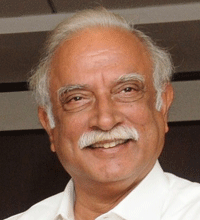|
 The
year 2018 has started on an optimistic note for India’s air cargo
stakeholders. The
year 2018 has started on an optimistic note for India’s air cargo
stakeholders.
The person holding out the lolly of hope
is none other than Civil Aviation Minister Ashok Gajapathi Raju.
In an interview at the beginning of this
year, Raju pointed out that though the potential for air cargo—especially
domestic—was high, cargo unfortunately was only a very small part
of Indian aviation.
Am
I Raju?
The minister went on to
emphasize the fact that the country had only two domestic freighter operators—Blue
Dart and Quikjet—though looking back in history, the India aviation
story had started with cargo.
Terming the mismatch as a “jigsaw
puzzle” that has never been pieced together, Raju said, “Somehow
the jigsaw puzzle never got put together.
“At least there is an attempt to
put it together.
“Let's see where it will take us.”
He was referring to the government’s
formation of the Air Cargo Logistics Promotion Board (ACLPB) that will
“strategize how to reduce costs, improve efficiency, and ensure
inter-ministry coordination.”
He was, however, quick to reiterate that
“we are not know-alls.”
“The aviation business is a continuous
process of learning and working.
“I will be very happy if cargo takes
off.
“Right now, it is very minuscule.”
The Minister’s guarded optimism stems
from the fact that air cargo promises to register a growth in double digits
over the next five years.
Numbers
Drivers
In FY18 (April 2017-March
2018), air cargo India is on track to deliver 14-15 percent in comparison
to the 12 percent in 2017, according to ratings agency Crisil.
The growth figures were largely due to
enhanced infrastructure, growing volumes, more connectivity, and a single
window clearance system.
A large percentage of the domestic growth
has been due to e-commerce. Kolkata airport, for instance, has seen a
huge jump in cargo volumes over the last few years, thanks to e-commerce.
An international metro airport, Netaji
Subhas Chandra Bose International Airport (as the Kolkata airport is called)
is the eastern gateway and a major hub for flights to South East Asia.
Once a major destination for European airlines
like Lufthansa and British Airways, the airport saw traffic going down
steadily due to a variety of factors. However, now the situation seems
to have changed.
No longer is weight an important criteria.
With weight no longer critical, today the number of packages that are
being shipped has grown by leaps and bounds.
 Tulsi
Speaks Tulsi
Speaks
Tulsi Mirchandaney, Blue
Dart Managing Director, was quoted saying that “the average weight
of packages that we ship has reduced to a fifth while we are carrying
five times more packages.” As a result, the Blue Dart freighter
that touches Kolkata has flown full.
The high growth of domestic e-commerce
cargo notwithstanding, no one looks ready to venture into freighter operations.
Word
Up Quikjet
Talking to ACNFT, Capt.
Preetham Philip, CEO of Quikjet, the all-cargo airline based in Bengaluru,
said that only when e-tailers start time-definite deliveries in India,
would new freighter operations start.
“Major e-tailers entered the Indian
segment with a standard delivery period of two days and express delivery
of next day delivery as practiced by their parent companies in the rest
of the world.
 “Today, possibly due to logistics constraints or specific domestic
reasons, the delivery date has changed to what we often refer to as Indian
Stretchable Time,” said Capt. Philip (left).
“Today, possibly due to logistics constraints or specific domestic
reasons, the delivery date has changed to what we often refer to as Indian
Stretchable Time,” said Capt. Philip (left).
“Simply put, the stretched delivery
date has become a norm,” he stressed.
Capt. Philip pointed out that while the
customer base has grown exponentially for e-tailers, “the philosophy
of ‘deliver as soon as possible’ has changed to an expedited
delivery in five days and for standard delivery to 10 days.”
Unlike e-tailers in mature markets who
consciously strive to continuously reduce the targeted delivery days,
“in India we have an industry that keeps stretching the number of
days for delivery.”
Capt. Philip mentioned that while this
could be argued as a connectivity problem, a study of the major movement
of freight by e-tailers indicate that the major movement was from metro
to metro.
What, then, is the constraint in India
for these e-tailers to consider surface transport, extensive warehouse
networks, and maintaining large inventories for greater cost-savings than
having an internal air freight network?
“The domestic air freight industry
is indeed looking at epic growth,” Capt. Philip emphasized, “but
the barriers for this growth continue to be a hindrance. Tier 2 and 3
cities’ connectivity is developing well with scheduled passenger
airlines and while substantial lift is available on these routes, the
tonnage and price competition with surface transport continues to be the
driving force.”
“Unidirectional loads also continue
to be a challenge,” Capt. Philip points out, “for the growth
of pure freighter networks.
“While demand exists on loads into
the North East, the challenge remains on loads coming out of the North
East.
“In fact, this holds true for even
neighboring international sectors like Dhaka to Delhi, Delhi to Kabul,
or Colombo to Delhi.”
These are sectors that have air freight
capacity, but the challenge remains on the return sectors.
The unidirectional loads make the price
point challenging for dedicated freighters.
Philip predicts that the domestic passenger
network will continue to see growth with added capacity—albeit in
small increments.
“This is in a market environment
that has the potential for tremendous growth,” Capt. Philip said.
Tirthankar Ghosh |




 Vol.
17 No. 7
Vol.
17 No. 7 Vol.
17 No. 8
Vol.
17 No. 8